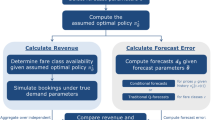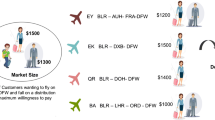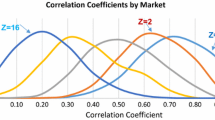Abstract
This article describes an approach to evaluating the quality of airline demand forecasting. It presents a a simulation framework that includes a detailed model for generating artificial demand. In this system forecasting methods can be compared in a stable, controllable environment. Their performance may be rated based on the overall system output in terms of revenue and bookings as well as through common error measurements. In addition, the use of a psychic forecast as a benchmark is proposed and illustrated by first results.







Similar content being viewed by others
References
Abdelghany, A. and Abdelghany, K. (2007) Evaluating airlines ticket distribution strategies: A simulation-based approach. International Journal of Revenue Management 1 (3): 231–246.
Algers, S. and Beser, M. (2001) Modelling choice of flight and booking class-a study using stated preference and revealed preference data. International Journal of Services Technology and Management 2 (1): 28–45.
Armstrong, J. (2001) Principles of Forecasting: A Handbook for Researchers and Practitioners. Norwell, MA: Kluwer Academic Publishers.
Cooper, W., Homem-de-Mello, T. and Kleywegt, A. (2006) Models of the spiral-down effect in revenue management. Operations Research 54 (5): 968–987.
Frank, M., Friedemann, M. and Schröder, A. (2008) Principles for simulations in revenue management. Journal of Revenue and Pricing Management 7 (1): 7–16.
Hopperstad, C. (2007) Market-based forecasting investigation I. PODS Consortium Meeting, Mainz, Germany, Cambridge, MA: MIT.
Littlewood, K. (1972) Forecasting and control of passenger bookings. AGIFORS Symposium Proceedings 12: 95–117.
McGill, J. and van Ryzin, G. (1999) Revenue management: Research overview and prospects. Transportation Science 33 (2): 233–256.
Nason, S. (2007) Forecasting the future of airline revenue management. Journal of Revenue and Pricing Management 6 (1): 64–66.
Pölt, S. (1998) Forecasting is diffcult – especially if it refers to the future. In AGIFORS Reservations and Yield Management Study Group Annual Meeting Proceedings. (Melbourne, Australia).
Talluri, K. and van Ryzin, G. (2004) Theory and Practice of Revenue Management. Boston: Kluwer Academic Publishers.
Theil, H. (1966) Applied Economic Forecasting. Amsterdam: North-Holl and Pub. Co.
Weatherford, L. and Belobaba, P. (2002) Revenue impacts of fare input and demand forecast accuracy in airline yield management. Journal of the Operational Research Society 53 (8): 811–821.
Weatherford, L. and Bodily, S. (1992) A taxonomy and research overview of perishableasset revenue management: Yield management, overbooking, and pricing. Operations Research 40 (5): 831–844.
Zeni, R. (2001) Improved Forecast Accuracy in Revenue Management by Unconstraining Demand Estimates from Censored Data. Newark, NJ: State University of New Jersey.
Author information
Authors and Affiliations
Additional information
1having graduated from the University of Paderborn, Germany, with a degree in Business Computing, Catherine Cleophas now is a student of the International Graduate School of Dynamic Intelligent Systems, Paderborn. Her doctoral work is sponsored by a Lufthansa fellowship and focuses on a concept of evaluating demand forecasts for airline revenue management.
3functions as Junior Professor since 2005 at the Decision Support & Operations Research Lab at the University of Paderborn, Germany. Her research focuses on planning for public transport with special regard to simulation and robust planning.
Rights and permissions
About this article
Cite this article
Cleophas, C., Frank, M. & Kliewer, N. Simulation-based key performance indicators for evaluating the quality of airline demand forecasting. J Revenue Pricing Manag 8, 330–342 (2009). https://doi.org/10.1057/rpm.2009.17
Received:
Revised:
Published:
Issue Date:
DOI: https://doi.org/10.1057/rpm.2009.17




